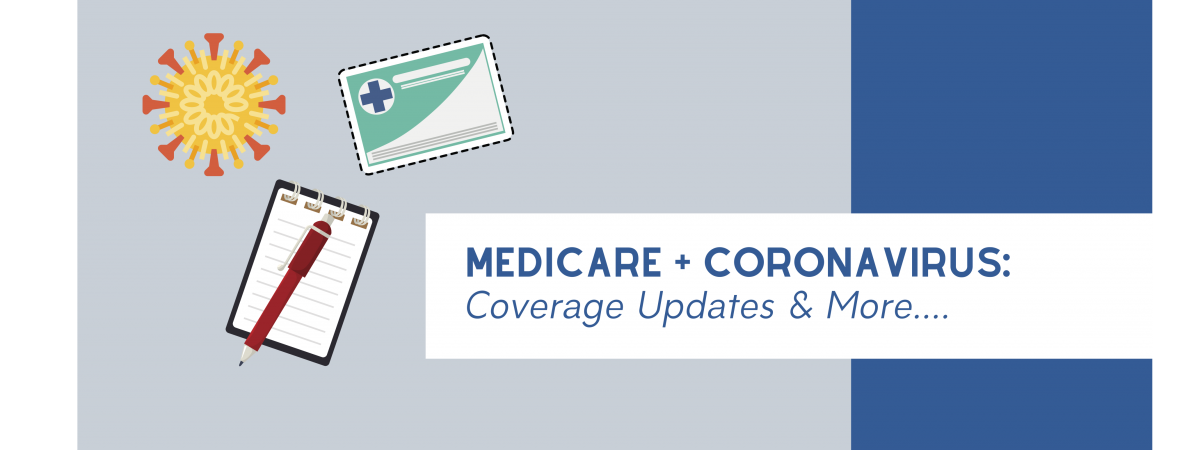
Reposted and shared directly from Medicare website: https://www.medicare.gov/medicare-coronavirus
Medicare covers related needs:
- Medicare covers the lab tests for COVID-19. You pay no out-of-pocket costs.
- Medicare covers all medically necessary hospitalizations. This includes if you’re diagnosed with COVID-19 and might otherwise have been discharged from the hospital after an inpatient stay, but instead you need to stay in the hospital under quarantine.
- At this time, there’s no vaccine for COVID-19. However, if one becomes available, it will be covered by all Medicare Prescription Drug Plans (Part D).
- If you have a Medicare Advantage Plan, you have access to these same benefits. Medicare allows these plans to waive cost-sharing for COVID-19 lab tests. Many plans offer additional telehealth benefits beyond the ones described below. Check with your plan about your coverage and costs.
- Scammers may use the coronavirus national emergency to take advantage of people while they’re distracted. As always, guard your Medicare card like a credit card, check Medicare claims summary forms for errors, and if someone calls asking for your Medicare Number, hang up!
Telehealth & related services:
Medicare has temporarily expanded its coverage of telehealth services to respond to the current Public Health Emergency. These services expand the current telehealth covered services, to help you have access from more places (including your home), with a wider range of communication tools (including smartphones), to interact with a range of providers (such as doctors, nurse practitioners, clinical psychologists, and licensed clinical social worker). During this time, you will be able to receive a specific set of services through telehealth including evaluation and management visits (common office visits), mental health counseling and preventive health screenings without a copayment if you have Original Medicare. This will help ensure you are able to visit with your doctor from your home, without having to go to a doctor’s office or hospital, which puts you and others at risk of exposure to COVID-19.
- You may be able to communicate with your doctors or certain other practitioners without necessarily going to the doctor’s office in person for a full visit. Medicare pays for “virtual check-ins”—brief, virtual services with your physician or certain practitioners where the communication isn’t related to a medical visit within the previous 7 days and doesn’t lead to a medical visit within the next 24 hours (or soonest appointment available).
- You need to consent verbally to using virtual check-ins and your doctor must document that consent in your medical record before you use this service. You pay your usual Medicare coinsurance and deductible for these services.
- Medicare also pays for you to communicate with your doctors using online patient portals without going to the doctor’s office. Like the virtual check-ins, you must initiate these individual communications.
- If you live in a rural area, you may use communication technology to have full visits with your doctors. The law requires that these visits take place at specified sites of service, known as telehealth originating sites, and get services using a real-time audio and video communication system at the site to communicate with a remotely located doctor or certain other types of practitioners. Medicare pays for many medical visits through this telehealth benefit.
Other ways Medicare is helping:
Every day, Medicare is responsible for developing and enforcing the essential health and safety requirements that health care providers must meet. When you go to a healthcare provider, you expect a certain standard of care, and we work to make sure you get it. That includes taking additional steps in response to coronavirus:
- Taking aggressive actions and exercising regulatory flexibilities to help healthcare providers and Medicare health plans.
- As part of an effort to address the urgent need to increase capacity to care for patients, hospitals can now provide hospital services in other healthcare facilities and sites that aren’t currently considered part of a healthcare facility. This includes off-site screenings.
- Waiving certain requirements for skilled nursing facility care.
- Establishing new codes to allow providers to correctly bill for services related to diagnosis and treatment of the illness.
- Instructing our national network of State Survey Agencies and Accrediting Organizations to focus all their efforts on infection prevention and other cases of abuse and neglect in nursing homes and hospitals.
- Instructing nursing homes and hospitals to review their infection control procedures, which they’re required to maintain at all times.
- Issuing important guidance answering questions that nursing homes may have with respect to addressing cases of COVID-19.